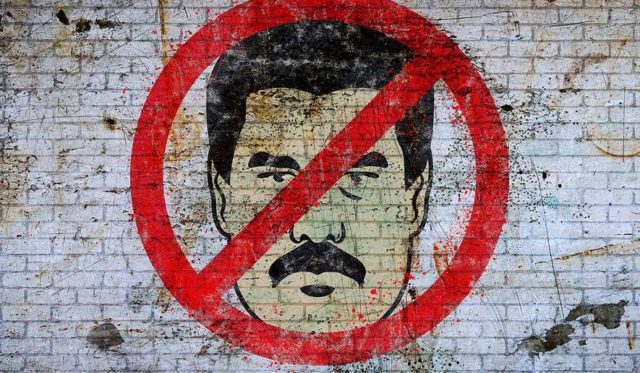The Russian- and Cuban-supported Maduro regime is getting bolder in attempts to crush the people of Venezuela — now working to block aid from coming across the border to the starving citizens.
Some of that aid is American, to the irritation of Sen. Bernie Sanders, who doesn’t believe in revolution to remove a socialist. Agreeing that Nicolas Maduro is not a nice man, Mr. Sanders called for a “free and fair election” instead. “That is a decision of the Venezuelan people.”
Actually, revolution appears to be the decision of the people — and support for the revolution is the appropriate American position.
The Monroe Doctrine defined America’s interests in the hemisphere, including recognizing and not interfering with existing colonies in the Western Hemisphere but closing the hemisphere to future colonization. And laying down the marker that any attempt to oppress or control any nation in the hemisphere would be viewed as a hostile act against the United States. The doctrine lived 190 years, mostly for better and sometimes for worse, until 2013 when Secretary of State John Kerry announced, “The era of the Monroe Doctrine is over.”
But power permits no vacuum. Venezuela is what happens when the United States withdraws and others — in this case Russia, Cuba and Iran — enter to stake their claims.
In December, Russia sent two nuclear capable bombers to Venezuela and engaged the Venezuelan defense minister in talks about conventional modernization. Russian media outlets report that Moscow wants to establish a forward outpost on the Venezuelan island of La Orchila in the Caribbean Sea to base the bombers, assuming the current crisis for Mr. Maduro ends with his retaining power.
To that end, while claiming no intention to send troops, Reuters reported in January that individuals linked to the Russian private military company Wagner were in the country. (Wagner provides the soldiers without insignia fighting Ukrainian troops in eastern Ukraine and were the Russians the United States killed in Syria.)
The nexus of oil, money, drugs and terror in South America has been long understood — and the relationship between Caracas and Tehran is built on Venezuela’s need for money and Iran’s desire to be based in the Western Hemisphere, as close to the United States as possible.
Iranian Rear Adm. Touraj Hassani Moqaddam said Iran’s new Sahand destroyer may be in Venezuela shortly. Mr. Moqqadam told the Iranian news agency Mehr, “Among our plans in the near future is to send two or three vessels with special helicopters to Venezuela in South America on a mission that could last five months.”
Some of this, of course, is for show. Russia does not need another Syria, and the Iranian navy has threatened before and then not shown up.
Their level of outrage and threat, however, is real. And it is an indication that this is not just about Venezuela, but about the sort of legitimate revolution that terrifies the clump of nasties standing by Maduro. Russia, Iran, China, Turkey, Bolivia, North Korea, Syria, Cambodia, Cuba, South Africa, and Nicaragua — plus the Palestinian Authority and Hezbollah — are all afraid of their own people. For good reason.
Who stands with the revolution? The United States, of course, with the Western Hemisphere — minus only those listed above (and Mexico and Uruguay who cravenly declared neutrality). Most of Western Europe plus Morocco and Israel. The Baltic States and most former Soviet colonies; notably Hungary and the Czech Republic, who understand revolution and didn’t get help when they needed it most. This is much of the community of democratic states.
Revolution is the honorable response to tyrants. Thomas Jefferson knew that:
“Whenever any Form of Government becomes destructive of these ends [enumerated in the document], it is the Right of the People to alter or to abolish it, and to institute new Government Prudence, indeed, will dictate that Governments long established should not be changed for light and transient causes; and accordingly all experience hath shewn, that mankind are more disposed to suffer, while evils are sufferable, than to right themselves by abolishing the forms to which they are accustomed. But when a long train of abuses and usurpations evinces a design to reduce them under absolute Despotism, it is their right, it is their duty, to throw off such Government.”
It was a mistake to give up the Monroe Doctrine — to announce our indifference when Russia, Iran, China and others probed and implanted themselves among our neighbors. Deft handling of international democratic support for the Venezuelan revolution can be our penance — and their salvation.






